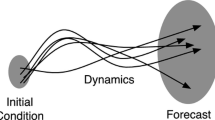Summary
The science of climatology is a branch of meteorology which arose through the recognition of stability in weather fluctuations which are not completely predictable by deterministic analysis alone. Observed climatological data series can be shown to be closely represented by ideal series of random numbers, and hence the climatological variable is a random variable. This makes application of the calculus of the random variable valid and leads to stochastic models for climatological analysis which are in good agreement with observation. This analysis furnishes the basis for climatological prediction which is shown to be a special case of synoptic prediction or weather forecasting. The stochastic processes of climatology are shown to have a physical basis. This is expressed by giving physical significance to the parameters of the probability function on the random variable and is the fundamental principle of dynamic climatology.
Zusammenfassung
Der Wissenschaftszweig der Klimatologie ist ein Teilgebiet der Meteorologie, das aus der Erkenntnis entstanden ist, daß in den Wetterschwankungen, die allein durch deterministische Analyse nicht vollständig vorhersagbar sind, eine Stabilität herrscht. Es läßt sich zeigen, daß beobachtete klimatologische Reihen sehr gut durch Reihen von Zufallszahlen darstellbar sind, und somit auch die klimatologische Variable eine Zufallsvariable ist. Daher ist es gerechtfertigt, die für Zufallsvariable abgeleiteten Rechenmethoden anzuwenden, und das führt zu stochastischen Modellen für die klimatologischen Analysen, welche mit den Beobachtungen in guter Übereinstimmung sind. Diese Analysen geben die Basis für klimatologische Vorhersagen, von denen gezeigt wird, daß sie Spezialfälle der synoptischen Prognosen oder Wettervorhersagen sind. Es wird auch gezeigt, daß die stochastischen Prozesse der Klimatologie eine physikalische Basis haben. Dies wird dadurch erreicht, daß den Parametern der Verteilungsfunktion der Zufallsvariablen eine physikalische Bedeutung unterlegt wird. Damit ist das Grundprinzip der dynamischen Klimatologie ausgedrückt.
Similar content being viewed by others
References
Schrödinger, E.: Statistical Law in Nature. Nature153, 704–705 (1944).
Khinchin, A. I.: Mathematical Foundations of Statistical Mechanics New York: Dover Publications, 1–12, 1949.
Swed, Freda S., andC. Eisenhart: Tables for Testing Randomness of Grouping in a Sequence of Alternatives. Annals Math. Stat.14, 66–87 (1943).
Bergeron, T.: Richtlinien einer dynamischen Klimatologie. Met. Zeits.47, 246–262 (1930).
Thom, H. C. S.: On the Statistical Analysis of Rainfall Data. Trans. Am. Geophys. Union21, 490–499 (1940).
Author information
Authors and Affiliations
Additional information
With 5 Figures
Rights and permissions
About this article
Cite this article
Thom, H.C.S. The analytical foundations of climatology. Arch. Met. Geoph. Biokl. B. 18, 205–220 (1970). https://doi.org/10.1007/BF02242876
Received:
Issue Date:
DOI: https://doi.org/10.1007/BF02242876




